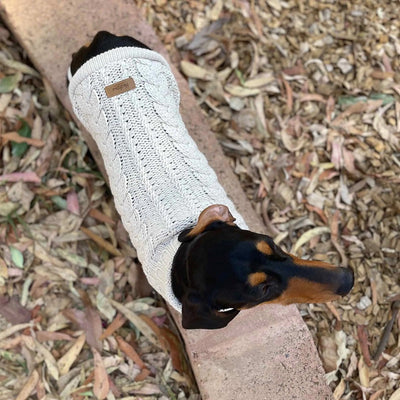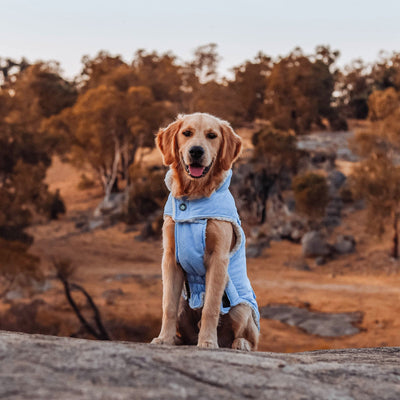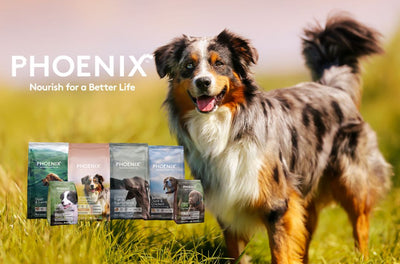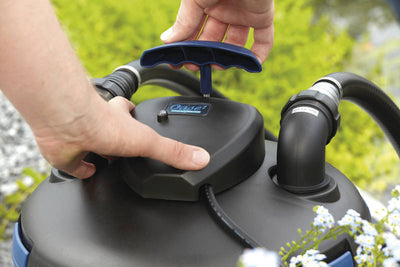 Is your dog constantly licking its paws? If so, it's important to investigate the underlying causes to ensure your furry friend's well-being. In this comprehensive guide, we will delve into the potential triggers behind your dog's paw licking, from anxiety to allergies and everything in between.
Is your dog constantly licking its paws? If so, it's important to investigate the underlying causes to ensure your furry friend's well-being. In this comprehensive guide, we will delve into the potential triggers behind your dog's paw licking, from anxiety to allergies and everything in between.
Paw licking can be a sign of anxiety in dogs. Just like humans, dogs can experience stress and anxiety that manifests in various ways, including excessive grooming behaviors. We will explore the different types of anxiety that could be affecting your pet and provide tips on how to manage and alleviate their anxiety.
Allergies can also be a culprit behind paw licking. Dogs can develop allergies to certain foods, environmental factors, or even specific materials they come into contact with. We will guide you through the process of identifying potential allergens and offer practical solutions to help your dog find relief.
By investigating the causes behind your dog's paw licking, you can address the issue at its root and provide them with the necessary support and care. So, let's dive into this comprehensive guide and help your furry companion feel their best.
Common causes of dogs' paw licking
Dogs licking their paws is a common behaviour that can have various causes. It's essential to understand these causes to address any underlying issues effectively. One of the primary causes is anxiety. Dogs, just like humans, can experience stress and anxiety that can lead to excessive grooming behaviours. This constant licking can be a self-soothing mechanism for them. It's crucial to recognise the signs of anxiety in your dog, such as pacing, panting, or destructive behaviour, alongside paw licking.
Another common cause is allergies. Dogs can develop allergies to certain foods, environmental factors, or even materials they come into contact with. Food allergies can manifest through paw licking, along with symptoms like itching, ear infections, or gastrointestinal issues. Environmental allergies, on the other hand, may be triggered by pollen, dust mites, or certain grasses, leading to paw licking as a way to alleviate discomfort.
Furthermore, medical conditions can also contribute to paw licking in dogs. For example, injuries or infections in the paws can cause pain and discomfort, leading to excessive licking. It's important to inspect your dog's paws regularly for embedded grass seeds, signs of injury or infection, such as redness, swelling, or discharge. Additionally, underlying medical conditions like arthritis or autoimmune diseases can also result in paw licking as a secondary symptom.
Understanding these common causes is the first step in investigating the root cause of your dog's paw licking. By identifying the underlying trigger, you can develop an appropriate plan to address the issue and provide your furry friend with the necessary care and support.
Allergies as a potential cause
Allergies are a significant potential cause of paw licking in dogs. They can develop allergies to various substances, including certain foods and environmental factors. Identifying and managing allergies is crucial for your dog's well-being and to alleviate their paw licking.
Identifying and Managing Food Allergies
 Food allergies can contribute to paw licking in dogs. Common allergens include beef, chicken, dairy, wheat, and soy. If you suspect that your dog has a food allergy, it's important to conduct an elimination diet to identify the specific allergen. This involves removing all potential allergens from their diet and reintroducing them one at a time while monitoring for any adverse reactions, including paw licking.
Food allergies can contribute to paw licking in dogs. Common allergens include beef, chicken, dairy, wheat, and soy. If you suspect that your dog has a food allergy, it's important to conduct an elimination diet to identify the specific allergen. This involves removing all potential allergens from their diet and reintroducing them one at a time while monitoring for any adverse reactions, including paw licking.
Switching to a hypoallergenic grain free diet or limited ingredient diet can also help manage food allergies in dogs. These diets are formulated with a reduced number of ingredients, making it easier to identify and avoid potential allergens. Additionally, there are supplements and probiotics to alleviate symptoms and support your dog's overall health.
Environmental Allergies and their Impact on Paw Licking
Environmental allergies can also contribute to paw licking in dogs. These allergies are often triggered by substances like pollen, dust mites, mould, or certain grasses. Paw licking can be a way for dogs to alleviate the itchiness and discomfort caused by these allergens.
 To manage environmental allergies, it's important to reduce your dog's exposure to potential triggers. Keep your home clean and free from dust and allergens by vacuuming regularly and using air purifiers. Additionally, bathing your dog with hypoallergenic shampoos can help remove allergens from their coat. Your veterinarian may also recommend antihistamines or other medications to manage your dog's symptoms and provide relief from paw licking.
To manage environmental allergies, it's important to reduce your dog's exposure to potential triggers. Keep your home clean and free from dust and allergens by vacuuming regularly and using air purifiers. Additionally, bathing your dog with hypoallergenic shampoos can help remove allergens from their coat. Your veterinarian may also recommend antihistamines or other medications to manage your dog's symptoms and provide relief from paw licking.
By identifying and managing both food and environmental allergies, you can significantly reduce your dog's paw licking and improve their overall quality of life.
Identifying and managing food allergies
Anxiety and stress can manifest in dogs in various ways, including excessive grooming behaviours like paw licking. It's essential to recognise the signs of anxiety in your dog and provide them with the necessary support to alleviate their symptoms.
Types of Anxiety in Dogs
There are different types of anxiety that can affect dogs, and each may contribute to paw licking:
1. Separation anxiety: Dogs with separation anxiety experience distress when separated from their owners, leading to excessive grooming behaviors like paw licking.
2. Generalised anxiety: Some dogs may have a more generalised anxiety that can be triggered by various factors, such as loud noises, unfamiliar environments, or changes in routine.
3. Social anxiety: Certain dogs may experience anxiety in social situations, which can cause them to groom excessively, including licking their paws.
Managing and Alleviating Anxiety
 Managing and alleviating anxiety in dogs can help reduce paw licking. Here are some tips to help your furry friend:
Managing and alleviating anxiety in dogs can help reduce paw licking. Here are some tips to help your furry friend:
1. Create a safe and comforting environment: Provide your dog with a designated space where they can retreat to when feeling anxious. This can be a crate, a cozy bed, or a quiet room.
2. Establish a consistent routine: Dogs thrive on routine, and having a predictable schedule can help reduce anxiety. Stick to regular feeding times, walks, and play sessions.
3. Provide mental and physical stimulation: Engage your dog in activities that stimulate their mind and body, such as puzzle toys, interactive games, or obedience training. This can help redirect their focus and alleviate anxiety. The range of Lickimats are an excellent starting point as your dog will recieve all the happy endorphins from licking and this will help redirect their licking habit!
4. Consider behavioural therapy: In severe cases of anxiety, working with a professional dog trainer or behaviourist can be beneficial. They can develop a customised training plan to address your dog's specific anxieties and help them overcome their excessive grooming behaviours.
 By understanding the different types of anxiety and implementing strategies to manage and alleviate them, you can help your dog find relief from paw licking and create a more relaxed and comfortable environment for them.
By understanding the different types of anxiety and implementing strategies to manage and alleviate them, you can help your dog find relief from paw licking and create a more relaxed and comfortable environment for them.
Environmental allergies and their impact on paw licking
While anxiety and allergies are common causes of paw licking in dogs, it's important to investigate other potential medical conditions that could be contributing to this behavior. Certain injuries or infections in the paws can cause pain and discomfort, leading to excessive licking as a way to alleviate the symptoms.
Regularly inspect your dog's paws for any signs of injury or infection, such as redness, swelling, or discharge. If you notice any abnormalities, it's important to consult with your veterinarian for a proper diagnosis and appropriate treatment.
Additionally, underlying medical conditions like arthritis or autoimmune diseases can also result in paw licking as a secondary symptom. These conditions require proper medical management, including medication and lifestyle adjustments, to alleviate the discomfort and reduce paw licking. Your veterinarian will be able to provide you with a comprehensive evaluation and develop an appropriate treatment plan based on your dog's specific condition.
By investigating and addressing these potential medical conditions, you can ensure that your dog receives the necessary care and treatment to alleviate paw licking and improve their overall well-being.
Anxiety and stress-related paw licking
Preventing and managing paw licking in dogs requires a multi-faceted approach that addresses the underlying causes and provides appropriate care and support. Here are some tips to help you in this process:
1. Regular grooming: Keep your dog's paws clean and free from dirt or debris by regularly grooming them. Trim their nails to an appropriate length to prevent any discomfort or pain.
2. Provide distractions: Engage your dog in activities that divert their attention away from paw licking. Interactive toys, puzzle feeders, or playdates with other dogs can help keep them mentally and physically stimulated.
3. Use deterrents: Consider using bitter-tasting sprays or topical treatments on your dog's paws to discourage licking. These products are safe for dogs and can help break the habit of excessive grooming.
4. Consult with a professional: If your dog's paw licking persists or worsens despite your efforts, it's important to consult with a veterinarian or a professional dog trainer. They can provide further guidance and develop a personalised plan to address your dog's specific needs.
Remember, each dog is unique, and finding the most effective method for preventing and managing paw licking may require some trial and error. Be patient and persistent in your efforts, and always prioritise your dog's well-being.
Investigating other medical conditions
While many cases of paw licking can be managed at home, there are instances where it's essential to consult with a veterinarian. Here are some situations where professional guidance is recommended:
1. Persistent or worsening symptoms: If your dog's paw licking persists or worsens despite your efforts, it's important to seek veterinary advice. This could indicate an underlying medical condition that requires further evaluation and treatment.
2. Signs of infection: If you notice signs of infection, such as redness, swelling, discharge, or a foul odor, in your dog's paws, immediate veterinary attention is necessary. Infections can be serious and may require antibiotics or other medical interventions.
3. Sudden behavioural changes: If your dog's paw licking is accompanied by sudden behavioural changes, such as aggression, lethargy, or loss of appetite, it's important to consult with a veterinarian. These changes could indicate a more complex underlying issue that needs to be addressed.
Your veterinarian is the best resource to evaluate your dog's specific situation and provide appropriate guidance and treatment. Don't hesitate to reach out to them if you have any concerns about your dog's paw licking.
Tips for preventing and managing paw licking
Paw licking in dogs can have various causes, ranging from anxiety to allergies and underlying medical conditions. By investigating the root cause of your dog's paw licking, you can address the issue at its source and provide them with the necessary support and care.
Start by considering anxiety as a potential cause. Dogs can experience different types of anxiety, and managing and alleviating their symptoms can help reduce paw licking. Furthermore, allergies, both food and environmental, can also contribute to paw licking in dogs. Identifying potential allergens and implementing appropriate management strategies is crucial.
Additionally, it's important to investigate other potential medical conditions that could be causing paw licking, such as injuries, infections, or underlying diseases. Regular paw inspections and consultations with a veterinarian are necessary to ensure your dog's well-being.
By following the tips provided in this comprehensive guide, you can prevent and manage paw licking in your dog. Remember to consult with a veterinarian if you have any concerns or if your dog's symptoms persist or worsen.
With your dedication and care, you can help your furry companion find relief from paw licking and create a happier, healthier life for them.
When to consult a veterinarian
Paw licking can be a sign of anxiety in dogs. Just like humans, dogs can experience stress and anxiety that manifests in various ways, including excessive grooming behaviors. When dogs feel anxious, they often resort to repetitive behaviors, such as licking their paws, as a way to self-soothe. This behavior can become compulsive and lead to skin irritation or even injuries.
There are different types of anxiety that could be affecting your pet. Separation anxiety is one common type, where dogs experience distress when separated from their owners. This can lead to excessive paw licking as a coping mechanism. Generalised anxiety, noise phobias, and social anxiety are other forms of anxiety that can also trigger paw licking.
To manage and alleviate your dog's anxiety, it's crucial to identify the underlying causes and provide appropriate support. One effective approach is to establish a consistent routine to help your dog feel more secure and reduce stress. In addition, you can create a safe and comfortable environment for your pet by providing them with a designated space where they can retreat and relax. Using calming aids, such as pheromone diffusers or anxiety wraps, can also help alleviate anxiety symptoms and reduce paw licking.
Remember, it's important to consult with a veterinarian or a professional dog behaviourist to determine the best course of action for your specific dog. They can provide personalised advice and guidance to help your furry friend overcome their anxiety and reduce their paw licking.
Understanding and addressing the causes of dogs' paw licking
Allergies can be another common cause of dogs' paw licking. Dogs can develop allergies to certain foods, environmental factors, or even specific materials they come into contact with. Identifying and addressing these allergens is crucial to provide relief for your dog and prevent further discomfort.
Food allergies can cause dogs to lick their paws excessively. Common food allergens for dogs include beef, chicken, dairy, wheat, and soy. If you suspect that your dog's paw licking is due to a food allergy, it's important to consult with a veterinarian for proper diagnosis. They may recommend an elimination diet or allergy testing to identify the specific allergen and guide you towards an appropriate diet for your dog.
Environmental allergies, such as pollen, dust mites, or mould, can also trigger paw licking in dogs. These allergies are typically seasonal and can cause itching and irritation in different parts of the body, including the paws. To manage environmental allergies, it's important to keep your dog's environment clean and free from potential allergens. Regular grooming, including wiping your dog's paws after walks, can help reduce exposure to allergens. Additionally, your veterinarian may prescribe antihistamines or other medications to alleviate the symptoms associated with environmental allergies.
Contact allergies occur when your dog comes into contact with certain materials, such as cleaning products, certain fabrics, or even specific plants. Paw licking can be a response to the irritation caused by these materials. Identifying the specific contact allergen can be challenging, but it's essential to eliminate or reduce exposure to the suspected irritants. Using hypoallergenic cleaning products, avoiding certain fabrics in your dog's bedding, and being cautious during walks in areas with potentially irritating plants are some ways to manage contact allergies and reduce paw licking.
By investigating the causes behind your dog's paw licking, you can address the issue at its root and provide them with the necessary support and care. Whether it's anxiety or allergies, understanding these triggers will help you take the appropriate steps to alleviate their discomfort and improve their overall well-being.
© weknowpets 2023





